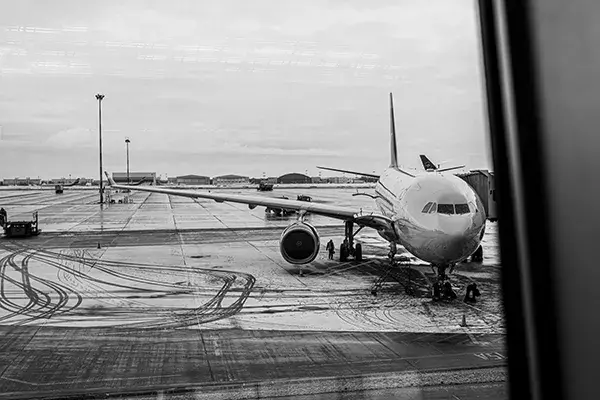08 May 2024 | Blog
US flight compensation update: Airlines will need to provide automatic refunds
08 May 2024 | Blog
US flight compensation update: Airlines will need to provide automatic refunds
At the peak of the COVID-19 pandemic, 87% of all complaints submitted to The US Department of Transportation (DOT) were about air travel refunds and the department claims that refund issues continue to account for a “substantial share” of the complaints received.
After ruling that “it is an unfair business practice for a US air carrier…to refuse to provide prompt refunds of airfare to consumers when a carrier has cancelled or made significant change to a scheduled flight to, from, or within the United States”, a new regulation from the DOT will come into effect from 28th October 2024 with the aim of ensuring passengers receive automatic refunds for ticket cancellations, substantial flight changes, and unprovided paid services. While it’s a sign of progress and an important change in making the travel experience as smooth as possible for the customer, it’s yet another challenge for airlines to overcome.
Understanding the new automatic refund rule
Our interpretation of the new rule is that it forces airlines to proactively refund passengers promptly for cancellations or significant changes to their itineraries (where they don’t accept re-accommodation alternatives) and for any paid services that were not realised, such as Wi-Fi, seat selection, or in-flight entertainment. If not delivered within a certain time frame, passengers who file a mishandled baggage report will also be entitled to a refund of their checked bag fee.
The ruling confirms that refunds must be made:
- In full: This includes all taxes, whether the airline can reclaim them or not.
- To the original payment method: No vouchers, travel credits or compensation can be given, unless the passenger chooses to accept this alternative.
- Within a strict time frame: Airlines have just seven days to refund tickets bought with a credit card, or 20 days for other payment methods.
- Automatically: The airline is responsible for making the refund without it being requested.
- To consumers who are unable to fly due to serious communicable disease: These customers must be issued vouchers or credits that are transferable and valid for at least five years.
Airlines are also required to proactively notify affected customers of their right to a refund.
Will this flight compensation rule affect all airlines?
The DOT's decision clarifies that all flights to, from, or within the United States - on foreign or domestic carriers - are subject to the same refund regulations.
So, while this mandate is only relevant to those flying in and out of the U.S., it is a level of service that passengers will become accustomed to, and therefore we would recommend that all airlines consider putting similar processes in place as passengers won’t hesitate to choose this greater level of customer service over a comparatively poor experience.
Is this DOT ruling different to EU261?
EU Regulation 261 (EU261) defines the passenger rights for those facing flight delays, cancellations, or denied boarding whilst flying within, to, or from the European Union (EU). Passengers may receive compensation ranging from €250 to €600 depending on the flight distance and delay duration. The regulation also mandates airlines to provide assistance like meals, refreshments, and accommodation depending on the delay length, and covers all flights operated by EU airlines as well as any departing from an EU airport. The United Kingdom, whilst no longer technically a part of the EU, also continues to offer the same rights to delayed travellers through "retained EU law”.
Beyond the fact that this ruling from the US Department of Transportation applies to US-based flights, we see differences in the specific conditions and compensatory measures between the two rulings. The largest difference being that EU261 does not specify the need for automatic refunds, meaning consumers need to manually file a claim for compensation. The DOT has imposed this new rule so that passengers can avoid “searching through airline websites to figure out how to make the request, filling out extra “digital paperwork,” or at times waiting for hours on the phone.”
Expert insights on the automatic refund rule
Nicholas Key, CEO of 15below, shares his perspective on the new ruling:
"This development in traveller rights is a big step in the right direction: It is what passengers have deserved for a long time and it’s a good thing that airlines are being forced now to elevate the service that they offer, particularly during and following acts of disruption which cause high levels of stress for everyone involved. However, we can’t ignore the fact that this new mandate represents yet another challenge that airlines must overcome. With the rule becoming effective in a couple of months, there is time to get the necessary processes in place, but airlines will need to act fairly fast.
"Automation is at the heart of everything we do, so at 15below, we are well equipped to assist airlines in putting processes and technology in place to get this right first time and avoid the inevitable fines that our industry face so often. We worked with airlines with routes into the U.S. in a similar way when the Centre for Disease Control gave them just two weeks to adapt their processes to capture and manage health attestations following the pandemic. These timescales are not ideal, but completely achievable.
"My advice is to carry out some Customer Journey Mapping for a delay or cancellation scenario to allow you to truly empathise with your passengers and make sure you don’t miss any details. This is what will allow you to stand out from the competition for all the right reasons.”
What this means for passengers and airlines
The rule aims to transform the travel experience, offering passengers greater power, clarity, and ease when dealing with flight disruption and service issues. This change ensures that passengers are compensated promptly, reducing the friction that is so often associated with the travel industry. Airlines will now be held to a much higher standard of accountability and so the new rule advises businesses to start making the necessary changes to their customer service processes and technology stack to accommodate these requirements.
With extensive experience working with airlines operating in and out of the US, 15below offers a range of tailored solutions to help you continue sending clear and compliant passenger communications.
Get in touch and our team will help identify the best solutions and approach for your airline.
For more details on this rule, visit the US Department of Transportation's official announcement.




